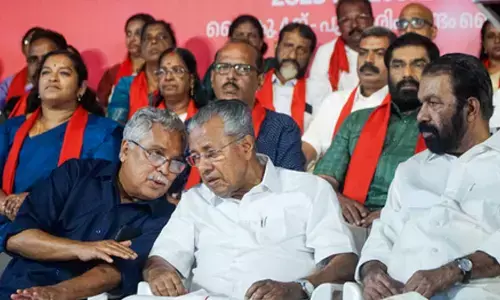A clever cat fools two monkeys

India has participated in the newly recently floated regional coalition known as the ‘Quad’, the quadrilateral formation that includes Japan, India, United States and Australia, but excluding China even though China is the dominant player in the region.
India has participated in the newly recently floated regional coalition known as the ‘Quad’, the quadrilateral formation that includes Japan, India, United States and Australia, but excluding China even though China is the dominant player in the region.
The ‘Quad’ is being seen as an American effort to encircle China with Japan in the east and India in the south. India’s participation in the ‘Quad’ signals her joining the United States against China—which are the two global centers of power today.
This stance of India is driven not by the long term geopolitical considerations but a hangover from the 1962 war that we are unable to overcome. In order to put the issue in perspective we have to look at the histories of China and the United States.
The Chinese civilization is basically inward-looking. Her main problem has been that she has been repeatedly subjected to attacks by neighbours from Mongolia, Korea, Japan, Vietnam, Burma and Tibet.
About 2,500 years ago during the Chin dynasty rule the Great Wall was constructed to keep the tribal intruders away. In sixth century during the Tang dynasty, peace was bought by handing over defense to non-Chinese peoples and generals.
In the tenth century, the Sung dynasty bought peace with the tribal people in the north by agreeing to pay a yearly tribute to them. In the thirteenth century, Mongol King Genghis Khan captured Beijing. China was encircled by France in Vietnam, England in Burma, Russia in Manchuria and Japan in Korea before the WWII.
The main problem faced by the Chinese rulers has been to protect their territory from such intrusions. Indeed, Chinese rulers have intermittently attacked certain neighbouring countries but that has been short-lived. In her long history of about 4,000 years China has not ever espoused Imperialistic ambitions. She has not conquered a single foreign land to plant her flag.
Tibet could be touted as an exception. But Tibet has been under Chinese suzerainty for some history, at least. It also acts as a buffer against foreign invasion from the southwest. Hence, its position is more like that of Bhutan and Nepal with India rather than of an independent nation marauded by Chinese conquerors.
Presently, the Chinese are trying to integrate Tibet with the mainland economy by building a railway line and settling mainland people in the region. The Tibetan leadership-in-exile considers this to be an affront to the culture of the Tibetan people.
But as far as basic economics or politics is concerned, China is behaving like a big brother, even though a domineering one, with respect to Tibet rather than like an Imperialist power seeking only to exploit its resources.
In comparison, America has been an aggressive country. Its foundations have been laid on the blood of native American Indians. European intruders killed the natives mercilessly and forcibly captured their territories.
America has launched wars in Korea, Vietnam, Afghanistan and Iraq since the WWII. It has unseated a number of democratically elected leaders like Salvador Allende of Chile and routinely supported blatantly anti-democratic regimes like that of Saudi Arabia for its commercial gains.
We have to choose between an inward-looking China and an aggressive and militant America. Fundamentally, China and India are similar and have lived peacefully with each other for 4000 years for this reason.
The main impediment to our friendship comes from the 1962 war. In his book ‘India’s China War’, Neville Maxwell had provided a wealth of data establishing that the war was triggered by India’s defence minister Krishna Menon’s reckless ‘Forward Policy’. Indian army made various uncalled for incursions in the disputed areas traditionally controlled by China.
The Chinese have a saying called ‘teaching a lesson’. It is a part of their strategic vocabulary. As far as they are concerned, 1962 was not about grabbing territory but it was about teaching India a lesson.
Therefore, we should accept our folly of 1962 and move ahead. France has made common cause with Germany despite it having been conquered and marauded by the latter. There is no reason why we cannot settle the border issues.
We are caught between two contradictory signals from China and the United States. China has a 4,000-year history of peace while it has fought a war with us in 1962.
The United States, on the other hand, has a 500-year history of violence and war but has helped us, for example, by providing wheat as aid to overcome the drought of the sixties. We have to decide whether we will determine our friend and foe on the basis of their fundamental character or on the basis of their relationship with us in the last seventy years.
My view is that we must give more importance to the fundamental character of the country because that will endure just as the doctor gives more importance to the main disease of the patient or the farmer gives more importance to the main seasonal variation. Short term events like the 1962 war with China and the food aid in the sixties must be seen as aberrations in the basic character of the two countries.
A friendship between India and China does not suit the clever American cat, however. The United States has employed our professors and bureaucrats to ramp up anti-China hype in the country in order to hide its own basic militant character and divert our attention to the short-term event of the 1962 war.
Our bureaucrats sing the American tune in the hope that they will be landed with plush assignments in the World Bank, United Nations, other multilateral agencies dominated by the Americans, American universities and American MNCs. One former secretary of power to the Government of India proudly told me that the World Bank had given him an assignment that paid Rs 65,000 per day.
I would think he would toe the line of the American masters of the World Bank. Our bureaucrats and professors spontaneously toe the American line in the hope of getting such assignments. Thus, the clever American cat has got India and China—the two foolish monkeys—to fight with each other. Author was formerly Professor of Economics at IIM Bengaluru
By Dr Bharat Jhunjhunwala











